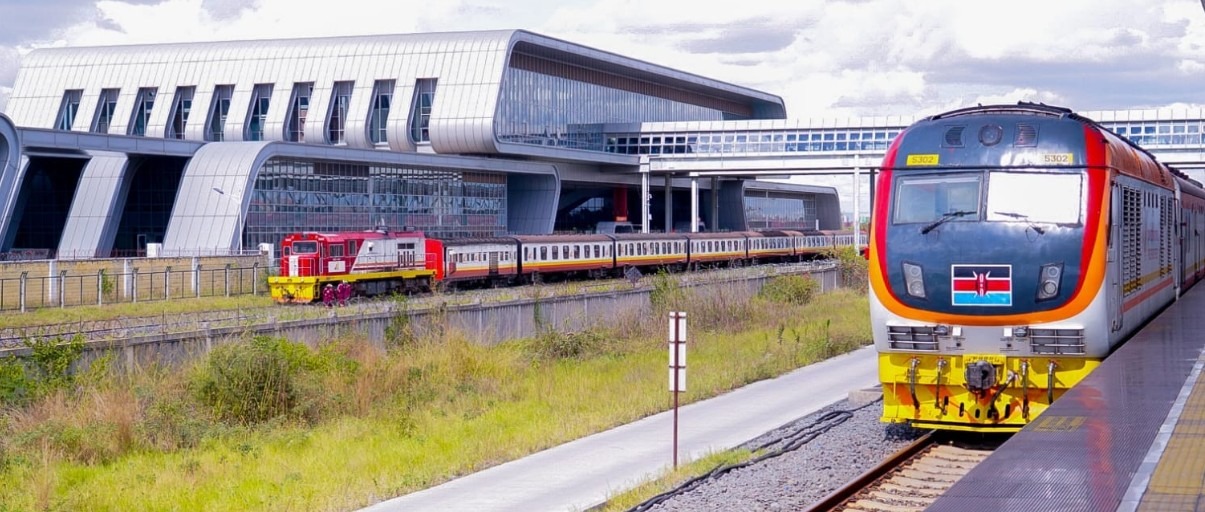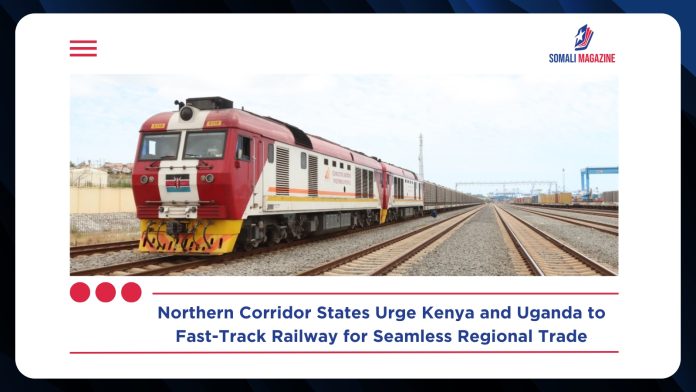Facebook Twitter (X) Instagram Somali Magazine - People's Magazine
Northern Corridor states pressure Kenya, Uganda to expedite railway, intensifying calls for swift action on the Standard Gauge Railway (SGR) extension amid mounting trade volumes and infrastructure bottlenecks. At a high-level summit held in Nairobi, ministers from Uganda, Rwanda, South Sudan, and the Democratic Republic of Congo urged Kenya and Uganda to fast-track construction of the remaining SGR sections to unlock seamless connectivity across East Africa.
The push comes as the region grapples with rising cargo volumes and costly delays along the 1,700-kilometre Northern Corridor, which links the Port of Mombasa to landlocked countries. With Kenya’s SGR currently terminating at Naivasha, and Uganda’s line still in early development, partner states say the lack of rail continuity is undermining trade efficiency and regional integration.
Kenya’s Roads and Transport Cabinet Secretary Davis Chirchir confirmed that feasibility studies and environmental assessments for the Naivasha-Kisumu-Malaba stretch have been completed, and compensation for affected communities is underway. He added that construction could begin as early as September, pending final funding agreements. “We are working in sync with Uganda to ensure the corridor is developed as one unified project,” Chirchir said.
Uganda’s Railway Corporation Managing Director Benon Kajuna echoed the urgency, revealing that Uganda has already paid its 15% counterpart funding to the contractor and begun preliminary works on the Malaba-Kampala section. “We expect full financing to be secured by December. This is a regional lifeline, and we must move together,” Kajuna stated.
The ministers agreed to jointly mobilize funds and harmonize technical standards to ensure interoperability across borders. Rwanda’s Infrastructure Minister Jimmy Gasore emphasized that isolated development would limit the corridor’s potential. “Kenya cannot fully benefit from its investment unless the railway reaches Uganda, Rwanda, and beyond,” he said.

The SGR extension is expected to cost over $5 billion, with Kenya and Uganda exploring public-private partnerships and concessional financing to ease the burden on taxpayers. China, which funded the initial Mombasa-Nairobi line, remains a key player, though both countries are now courting a broader pool of investors.
Beyond rail, the summit highlighted the need to integrate road, lake, and pipeline infrastructure to create a multimodal transport network. The Northern Corridor Transit and Transport Coordination Authority (NCTTCA) reported that cargo dwell time at Mombasa Port has improved to 3.5 days, but transit to Kampala still averages 7–10 days due to multiple checkpoints and non-tariff barriers.
The East African Business Council estimates that inefficiencies along the corridor cost regional economies $2 billion annually in lost competitiveness and inflated consumer prices. Development partners, including GIZ and the EU, pledged support for green freight strategies and logistics hubs to reduce environmental impact and boost resilience.
As the region prepares for the 15th Northern Corridor Summit, stakeholders are optimistic that renewed political will and strategic coordination will accelerate progress. The ministers also committed to finalizing legal frameworks for cross-border asset maintenance and inland water transport, signaling a broader vision for integrated development.
With Africa’s population and trade volumes surging, the Northern Corridor remains a critical artery for economic growth. The pressure on Kenya and Uganda to deliver is mounting, and the stakes have never been higher.

